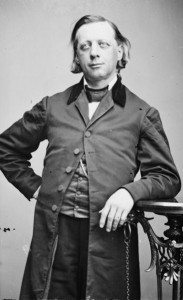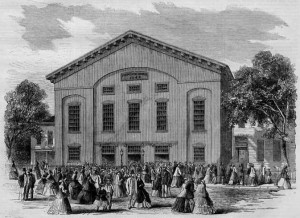In 1860 several states, including New York, declared November 29th Thanksgiving Day. One of the ways people celebrated Thanksgiving Day back then was by going to church and listening to long sermons by their preachers. On November 30th The New-York Times published several of these sermons. People were interested in how ministers would use Thanksgiving Day to preach about the impending secession crisis.
The New-York Times reprinted several sermons from around the metropolitan area. Henry Ward Beecher spoke at his Plymouth Church in Brooklyn. From The New-York Times November 30, 1860:
“At an early hour the house was thronged by patient thousands, waiting for the service to commence, while hundreds had to leave or stay unaccommodated with seats.”
In Beecher’s long sermon he gave reasons for Thanksgiving and also pretty much identified Fernando Wood, New York City’s Democrat mayor, as Satan because of Wood’s dour Thanksgiving proclamation. Later on he got down to the issues of slavery and secession:
OURS IS A PIVOTAL PERIOD. The strife is between a dead past and a living future — between a wasting evil and a flourishing good — between Barbarism and Civilization. [Subdued applause.] You may not have asked for or desired this conflict. God has sent it to you. It has come, and you MUST TAKE SIDES.
Your only option is — which side? If you accept the radical ideas of the North you contest for civilization — if for those of the South you contest for barbarism. There is, there can be, no further compromise. There have been many things between us that were fair subjects for argumentation, and for honest difference of opinion, about which one side might claim with apparent equity, what the other side would with equal vehemence deny. But now they are all swept away — there’s a fair, free range from battery to battery — the guns are loaded and the match prepared — the conflict is coming, and you must take sides — away with compromises — and woe be to that luckless wight, who in the rage of battle is found midway between the two. He’s of no use to either, and a fair shot for both. At last the North has been called upon to stand up and fight. Not for Connecticut clocks, not for ear-rings or slave whips, not for cart-wheels or prints, or carriages or lines, but for principle and for God. God is worthy the occasion if you are not worthy of him. A nobler field was never found. A contest between Christian civilization and savage barbarism.
I do not pronounce the Southern people to be a barbarous people; I say nothing about them; I make no charge. If the things that are done there were done here, I should say they were barbarous. I may not know. I do, however, unhesitatingly say that the distinctive idea of the Free States is an element of Christian civilization, and that of the South is barbaric; and that the real conflict in this nation to-day is between Barbarism and Civilization. The one is like a pure white alabaster box, full of all purities and refinements — the other is like Pandora’s box, full of all evils and black, black wickedness. The conflict, then, has come; and it is my business to keep you in the ranks, and to see that you are inspired to fight with heroism. …
The Southern States have organized society around a rotten core — Slavery; the Northern States organized society about a vital heart — Liberty. At length both stand mature. There they are in contrast. God holds them up to the ages and nations, that men may see the difference.
And now there is a conflict — which is to yield?
Is Liberty to uncover her fair head? Shall she lay aside her opal-lined crown and her diamond-studded sceptre upon the altar of oppression? Shall she walk captive? Or shall black Slavery be discrowned and abased? The two Queens cannot reign in the same land. One must yield. Which shall it be? …
It is asked what we should do? Speak the truth. Permit no half-way measures or men. These half-way men are of no use — they can never get to Heaven — they are not known in hell, and are not wanted on earth. [Audible cachinatim.] We want no half-way. Let the South keep its institutions in her own territory — we don’t wish to touch them or injure them; they have already gotten the advantage of us. They shall have all that the Constitution has granted them — all that history has yielded them. But if they ask us to make the air of the North favorable for a slave’s breath, we won’t! We shall stand by our rights, even as they desire us to stand by their rights. …
So, we’ll waste no superfluous tears, we’ll trust in God and the spirit of Christianity among the people, believing that we shall endure for many years yet to come, and that the youngest member of this congregation shall, until his dying year, even when his hair shall be white like the snow, come up here to spend his annual Thanksgiving — a thanksgiving grounded upon the love of God — that God who has given us Liberty — Liberty, so precious for us and our children.
There was much more in Beecher’s sermon. You can read much more of Beecher’s address and other sermons at The New York Times Archives
I was struck by Beecher’s strong and stark anti-slavery rhetoric; however, in Henry Ward Beecher: An American Portrait Paxton Hibben focuses on the more conciliatory parts of Beecher’s Thanksgiving address. Hibben says that Beecher was concerned about the financial impact a civil war would have on Beecher’s much-needed benefactors. Hibben says that Beecher was not involved with intense Wide-Awake activity during the 1860 campaign. In Sinclair Lewis’ foreward to Hibben’s book, Lewis says that Beecher was a “combination of St. Augustine, Barnum, and John Barrymore”. Maybe he was also a politician. Even Lincoln is sticking to his conciliatory words to the South while remaining firm in his opposition to the expansion of slavery.
I think Beecher really is being tough on the South – he says the North will abide by the Constitution but will continue to ignore the Fugitive Slave Law, or at least that the Fugitive Law is unenforceable:
My words are, I see, being reported, and in the papers they will go over the land, and as the papers even sometimes go South, perhaps they will get to Charleston. And I want to say to my Southern brothers we will remain faithful to our compact, we will be loyal to the Constitution, but we won’t lie to you. We will hunt or stop your slaves. It cannot be. So long as there is bread in the larder, and water in the cruise; so long as there are hills to hide among, and valleys through which to travel; so long as humanity and freedom reigns in the heart of the North — so long men must and will escape from Slavery, and fugitives will gain their freedom! …
Concerning the Compromise of 1850, you were fully advised. They promised finality. Did you get it? Yes, with the butt end of a club! They renewed their courage, and destroyed the Missouri Compromise — an evil only equaled by the enormity of the one which destroyed it, and what has been the result? Growing wickedness, excitements and turmoils beyond precedent.
Notes
1. Beecher was Harriet Beecher Stowe’s brother.
2. Henry Ward Beecher: An American Portrait, Paxton Hibben. The Readers Club, New York 1942
3. Hibben says there was enormous interest in the North on where non-Abolitionists stood on the impending secession crisis. That might be one reason for The Times reprinting so many of the sermons
As always, I’m interested in your views. Thank you.


